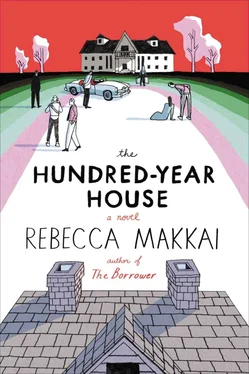“And why, pray tell, do you possess a pistol cylinder?”
She tried hard to understand, and finally realized Cole was looking down at her desk. The metal flower, from the woods.
She picked it up and looked through the six perfect holes. She felt stupid — hadn’t she seen them in a thousand movies? — but Cole didn’t need to know that. “Souvenir,” she said. “From my last shootout.”
And there was Chad Crosley walking in to ask about his C-minus paper, beet red, hands around his eyes like blinders. He’d been warned.
Leland’s apartment in Evanston smelled pleasantly of cigar smoke. The walls were lined with bookshelves, and an inordinate number of small, dim lamps lit the living room. The three of them sat on the floor, around the neat stack of files and the lockbox. It had been two days since the fund-raiser, but this was the first time they’d been able to meet. Doug had said he was going to the Northwestern library, and Miriam had invented a yoga class.
“Did you read the files?” Doug asked.
“I did better.” Leland flicked the lockbox open, and Miriam applauded. “Well, my locksmith buddy did better.”
“What’s in it?” Doug lifted out the stack of papers and envelopes.
“Nothing good, sorry to say. It’s just Gracie’s stuff. We can’t be this lucky with locks and get lucky with the content too. But you have your Parfitt file, right?”
“You really didn’t look? That’s amazing restraint.” Doug ceremoniously opened the file to reveal the photograph: wet bodies, laughter, penises.
“Jesus God,” Leland said. “Is that Parfitt?”
“Not even.”
Miriam had gone bug-eyed, and some old rule flitted through Doug’s mind, something about not being vulgar in front of southern women. But what she finally said was, “You know what’s weird? They don’t even have hard-ons. I mean, it’s not sexy , you know?”
Leland turned it over. “Crap. Did you see this?” He pointed to the spidery handwriting on the back, the single slanted word and question mark: Father? “Someone thinks that’s their father? It can’t be Parfitt’s father, right? The photo quality looks like twenties or thirties, at least.”
As Leland and Miriam passed the photo, Doug flipped through the lockbox papers. The 1954 deed to a car. A 1955 marriage license for George Robert Grant and Grace Saville Devohr. A copy of Gracie’s birth certificate.
“Hey, guys,” he said. “How old did you think Gracie was?”
“Sixty,” said Leland. “Maybe fifty-eight.”
“Sixty-two,” Miriam said. “Bruce is sixty-four, and she’s two years younger.”
“Look.” He put the certificate on the floor. “1925. She’s seventy-four.”
They both squinted at it, with as much voyeuristic glee as they’d ogled the photo.
“So she had Zee when she was forty,” Doug said. “But does Bruce really think she’s younger than him?”
“Maybe that’s why she didn’t want you in the attic,” Leland said.
Miriam said, “That’s why she’s afraid of getting put on the Internet! She doesn’t want anyone doing the math.”
They spent the next hour poring over the 1933 files, and the one major validation for Doug was the fact that at the end of the file lay a document with the heading “Confirmed Guests, Winter 1934,” in which “E. Parfitt” was listed, alongside the note “(4th visit).” Although there was nothing he could immediately use, there was the promise of more. And the fact that the records were so detailed boded well for lists of who was there with Parfitt on his other stays, even minus anything meaningful in his own file. The other artists might even have mentioned him in their own diaries and correspondence. It would be enough for a clever writer to build some analysis around, some stuff about influence — provided he could get back up to the rest of the files. They’d left the attic door unlocked, but they were sure Sofia, ever thorough, would have discovered it by now and said something to Gracie.
They ordered pizza and Leland dialed up his Internet. Their intent was to find Gracie, to see what was already out there about her. Leland had some vague idea that Doug could use her real birth date to his advantage, either by threatening to expose her or promising to protect her, though Doug doubted he had the guts to pull off either. They found a photo of Gracie as a toddler, blonde curls and a white dress; and another of her at eleven or twelve with her three younger brothers, all a bit petulant next to their dour grandfather, Augustus. It was, indeed, dated 1936. (“My God,” Miriam said, “see, he’s terrifying! Don’t you think he murdered Violet?” “No, but I can see why she wanted out,” Doug said. And Miriam said, “I’m glad it’s her ghost and not his .”) And then, following Leland’s hunch, they looked up Gracie’s father, Gamaliel, and studied his face.
“That could be him,” Leland said. He was holding the photo of the two naked men next to the computer, comparing the stern businessman on the screen with the naked man on the right, the one throwing his head back in laughter. “It’s a funny angle.”
Miriam said, “And we don’t have Gargamel’s penis online, for comparison.”
“I can’t imagine the chain of events, though,” Doug said. “Gracie finds this picture, recognizes her father, writes on the back, and then of all things she puts it in Edwin Parfitt’s empty file folder?”
“ Or ,” Miriam said, “she emptied the folder because she knew you’d get up there. And she put this there instead.”
“Does she hate me that much?”
“Why else would this be the only file that’s different? Like, where’s his confirmation letter? Where’s his application?”
They stared a bit longer at the online photo of Gamaliel. He was older, but the chin was right, the ears were feasible. Doug remembered that game from the senior yearbook, match the baby with the eighteen-year-old, and how it had been impossible, except for the one Asian kid. Impossible to identify the people who had been your whole world for four years.
It was getting late, but there was more to discuss: How to return the lockbox to the attic, for instance, before Gracie discovered it was gone. How to get the rest of the files.
Leland said, “Look, you don’t need to sneak around anymore. You don’t need to pretend you did nothing wrong. You can play your hand.”
“I didn’t know I had a hand.”
“You have — you have some tools at least. You know Gracie’s real age. You know her father might or might not have gone skinny dipping with a male companion.”
Miriam said, “We know she either hates Doug or doesn’t want him writing about Laurelfield.”
“That’s not really a tool,” Leland said.
“ You’re a tool.”
He pelted her with a pizza crust.
Doug added, “And we know her biggest fears. That civilization ends on the thirty-first, or that it doesn’t and the Internet survives.”
Miriam nodded slowly. “That’s all you need, isn’t it? That’s all it takes to run the world. Knowing people’s fears.”
(The air between
our bodies
The miles between
intention
and act
The windows, eclipses, forgettings, doorways,
misses and losses and half-slept dreams
The shrinking space between now
And century’s end
Here
Under stone
Overboard
I’ll tell
the secret I have seen:
The ghosts live in
the space between)
Читать дальше












